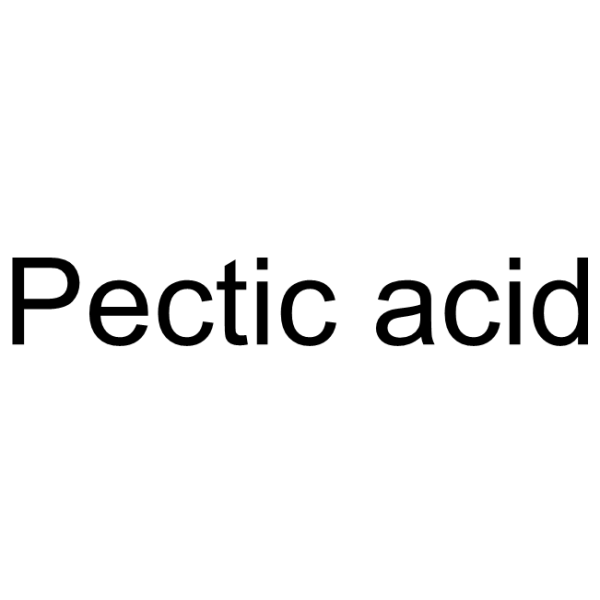Pectic acid

Pectic acid structure
|
Common Name | Pectic acid | ||
|---|---|---|---|---|
| CAS Number | 9046-40-6 | Molecular Weight | 546.38800 | |
| Density | N/A | Boiling Point | N/A | |
| Molecular Formula | C18H26O19 | Melting Point | N/A | |
| MSDS | USA | Flash Point | N/A | |
Use of Pectic acidPectic acid (Methyl protopectin), a polygalacturonic acid, induces cell apoptosis and necrosis in pituitary tumor cells. Pectic acid can be used in the research of cancers and autoimmune disease[2][3]. |
| Name | (2S,3R,4S,5R)-6-[(2S,3R,4R,5R)-2-carboxy-6-[(2S,3R,4R,5R,6S)-2-carboxy-4,5,6-trihydroxyoxan-3-yl]oxy-4,5-dihydroxyoxan-3-yl]oxy-3,4,5-trihydroxyoxane-2-carboxylic acid |
|---|---|
| Synonym | More Synonyms |
| Description | Pectic acid (Methyl protopectin), a polygalacturonic acid, induces cell apoptosis and necrosis in pituitary tumor cells. Pectic acid can be used in the research of cancers and autoimmune disease[2][3]. |
|---|---|
| Related Catalog | |
| In Vitro | Pectic acid (2.5-100 μg/mL, 30 min) stimulates the release of prolactin (PRL) in GH3/B6 cells, without affecting the viability of cells[1]. Pectic acid (100 μg/mL-5 mg/mL, 6-48 h) increases cell death and DNA damage in GH3/B6 cells, detected by MTT assay and AO/EB staining[2]. Pectic acid (100 μg/mL-1 mg/mL, 24 h) induces apoptosis in GH3/B6 cells in a dose-dependent manner[2]. Pectic acid (2.5-5 mg/mL, 24 h) induces necrosis in GH3/B6 cells, confirmed by PI staining[2]. Cell Cycle Analysis[2] Cell Line: GH3/B6 cells Concentration: 1 mg/mL Incubation Time: 24 h Result: Induced sub G1 events, and DNA fragmentation, which was correlated with the number of the apoptotic cells. |
| In Vivo | Pectic acid (25 and 100 mg/kg, oral gavage) increases colon length, downregulates disease activity index, histopathological score and proinflammatory cytokine levels in Ulcerative colitis (UC) mice[3]. Pectic acid (6.25 and 12.5 mg/kg, intravenous injection) rescues the reduction in colon length in UC mice[3]. Animal Model: Ulcerative colitis (UC) mice[3] Dosage: 25, 100 mg/kg Administration: Oral gavage Result: Exhibited the longest colon, lowest DAI, and minimum histopathological score. Decreased the proinflammatory cytokines in the colonic tissue of UC mice. Animal Model: Ulcerative colitis (UC) mice[3] Dosage: 6.25, 12.5 mg/kg Administration: Intravenous injection Result: Decreased the spleen and thymus index. Restored the Th17/Treg balance in the spleen and lamina propria of UC mice. Improved the gut microbiota composition. |
| References |
| Molecular Formula | C18H26O19 |
|---|---|
| Molecular Weight | 546.38800 |
| Exact Mass | 546.10700 |
| PSA | 319.89000 |
| InChIKey | LCLHHZYHLXDRQG-ZNKJPWOQSA-N |
| SMILES | O=C(O)C1OC(OC2C(C(=O)O)OC(OC3C(C(=O)O)OC(O)C(O)C3O)C(O)C2O)C(O)C(O)C1O |
| Personal Protective Equipment | Eyeshields;Gloves;type N95 (US);type P1 (EN143) respirator filter |
|---|---|
| RIDADR | NONH for all modes of transport |
|
Substrate specificity of plant and fungi pectin methylesterases: Identification of novel inhibitors of PMEs.
Int. J. Biol. Macromol. 81 , 681-91, (2015) Pectin methylesterases (PMEs) play a central role in pectin remodeling during plant development. They are also present in phytopathogens such as bacteria and fungi. We investigated the substrate speci... |
|
|
Optimization of pectin extraction from banana peels with citric acid by using response surface methodology.
Food Chem. 198 , 113-8, (2016) A central composite design was used to determine effects of pH (2.0-4.5), extraction temperature (70-90 °C) and time (120-240 min) on the yield, degree of methoxylation (DM) and galacturonic acid cont... |
|
|
Pomegranate peel pectin films as affected by montmorillonite.
Food Chem. 198 , 107-12, (2016) The industrial production of pomegranate juice has been favored by its alleged health benefits derived from its antioxidant properties. The processing of pomegranate juice involves squeezing juice fro... |
| Poly(1,4-|A-D-galacturonate) |
| |A-D-Polygalacturonic acid |

